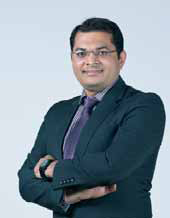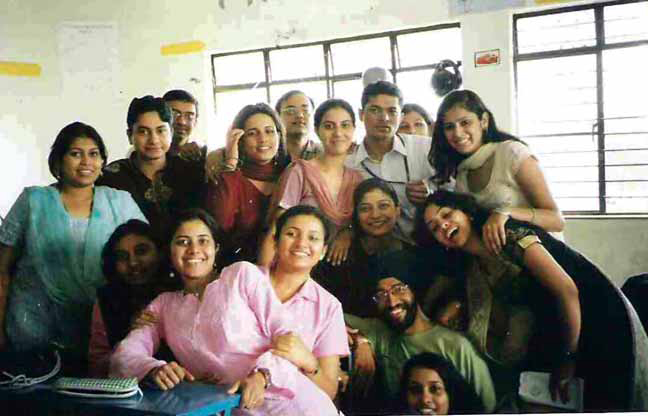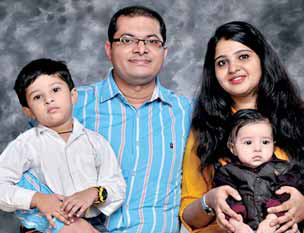Issue No.21 / January 1-15,2016

Getting the right push is critical for anyone starting their career. The right institute, teachers, friends and family can transform a young student into a remarkable corporate leader. This is the story of Atul Tiwari, who has travelled the globe, built a stellar corporate career and steadily climbed to the apex of his craft. Corporate Citizen brings you the fascinating conversation with the young maverick from the HR fraternity
I have been working for the past ten years. Being a 2004-06 batch student of a leading B-school in India, I got placed at Hexaware technologies from the campus, with a package of Rs.5 lakh, back in 2004. The role offered to me was pretty good with an option of being placed in Mumbai or Chennai. I was glad that I got posted in Mumbai.
I worked with them for three and a half years. Travelling across the globe in that role, I got a lot of exposure with MNCs, and implemented PeopleSoft HR for their geographies. I travelled across 18 APAC (Asia-Pacific) countries. Then I moved to IBM and was posted in Gurgaon. From there, I went to Switzerland, because one of our clients there was Credit Suisse. I stayed there for four months. It was extremely luxurious. I then moved to the US, in Minneapolis, one of the coldest cities in the country. I also travelled to Mexico and Canada and implemented HR strategies there. Around this time, I was getting married, and I came back to India. I got through PriceWaterHouseCoopers in Gurgaon. I moved into a purely HR consulting role, which was my first experience with Indian customers. I consulted for both the private and government sectors. Around this time, PeopleStrong, which I would say is the first HR outsourcing firm in India, offered me a role as head HR. I expanded myself as I like to experiment.
HRO is entirely different from traditional HR. Sometimes, companies outsource their entire HR function to third parties. That is what we do. It is a 360-degree solution. In the US, there are about 35 registered HRO companies. In India, there are barely any. We are the biggest RPO (Recruitment Process Outsourcing) in India. We also undertake HR-shared services. From recruitment to discharge, we handle everything. We also do compliance functions as per labour laws. We also process payroll for over 1,50,000 customers.
We also have our own technologies, our software which are up to global standards. We have over 150 people working on software.
I have learnt that the ship of positivity can pass through a sea of negativity as long as it doesn’t let the negativity enter it. If you have self-confidence,you will always succeed

My father was in defence forces, so I applied for a defence campus in Pune. I also applied for a campus in Kolkata. During this time, I saw the ad for a leading management institute in Pune. It was run by our director Col. Balasubramanian, who hails from an illustrious army background. I applied to the admission centre in Hyderabad. I was impressed by the student co-ordinators there. I saw discipline, determination and dedication. I was shortlisted, and interviewed by our Director himself. I expressed interest in the institute, and specifically asked for HR for two reasons. 1) I am an engineer with specialization in mining. I always linked HR to recruitment. I also had an interest in psychology, and HR has its roots in psychology. 2) On the philosophical side, as a miner, I learnt how to extract precious metals from the earth’s crust, which is similar to what an HR does, who identifies talent in the rough. I got selected, and decided to join. At the same time, I got the clearance from the prestigious defence campus I had applied for. Unsure which road to take, I decided to take a risk and joined my current institute. And I must say, it was the best decision I could take. The institute shaped me in a big way—a complete change of personality and outlook. I attended the work-shops, especially for HR. The first workshop for HR was on psychology. The sessions were very interactive. Our Director himself took sessions, which I was very keen on to attend. I also got great industry exposure. Top industry leaders for various companies came to the institute and imparted their knowledge, which was priceless. Another thing that now has seeped into my blood is discipline, which I learnt from the institute. It is now part of my psyche. Our Director’s story is also a source of inspiration to me. I have learnt that the ship of positivity can pass through a sea of negativity as long as it doesn’t let the negativity enter it. If you have self-confidence and a positive outlook, you will always succeed in life. These are just some of the things which I learnt from my institute and transformed my life forever.
It was an arranged marriage. I was in the US and she was working in ADS in India. My dad was in the Air Force, and her brother was in DRDO. There they met, and the alliance came about. I first saw her over the webcam, and we used to chat online, and November17th was the first day I saw her in person. On November 29th I got engaged and on December 8th, we got married. Now, we have two lovely sons, Samyak, the elder and Atharva, the younger.
Earlier I used to work to live, rather than live to work. I used to work from not more than six to seven hours. But once I got into PeopleStrong, the ground level work was a lot more. I work around eight to ten hours, because I have a lot to learn. Even then, I make it a point to maintain work-life balance, and I spend weekends with family.
I have had a great journey. I feel I have tried a lot of different roles in HR, and to get the position of Head HR is only seven years is no easy task.
A miner extracts precious metals from the earth’s crust, similar to what an HR does, who identifies talent in the rough
I am fortunate to have parents who are devoted to their grandchildren, so my wife and I can work without any worries. I am forever grateful to them for that. Fortunately, even my wife has a great equation with my parents, so it’s really a great family.

I would say, as for any aspect of life, there is a difference between a leader and others. There are certain aspects of leaders which are universal—having patience, believing in yourself, respecting elders, building capacity, and giving time to family. Marriage requires time and patience.
Turbulence is natural, but eventually it settles down. You have to be patient. Especially for men, it is their responsibility to take care of the girl who has left her family and come into yours, at least till she settles down. Individuality is also very important. I am a vegetarian Brahmin. My wife used to eat eggs, due to medical reasons. However, after marriage, she decided on her own not to have eggs any more. It was her own choice.
By Neeraj Varty